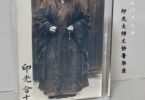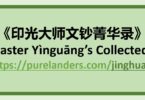穿衣吃饭,泄气须知
[219] [What] Should [Be] Known [About] Wearing Clothes, Eating Meals [And] Letting Out Air
学佛之人,夜间不可赤体睡,须穿衫裤。以心常如在佛前也。
Of people learning Buddhism, [at] night time, [there] must not [be with their] bare bodies sleeping. [They] must wear shirts [and] pants, with [the] mind [of being] constantly like before [the] Buddha.
[Note 1: As all Buddhas are everywhere at all times in terms of their Dharma Body (法身), this aids in cultivating reverence (恭敬) to them everywhere at all times.]
吃饭不可过度,再好的饭,只可吃八九程。若吃十程,已不养人。吃十几程,脏腑必伤。常如此吃,必定短寿。
Eating [of] meals must not [be] excessive. Even [when having a] better meal, [there] can only [be] eating [of] eight [to] nine measures. If eating ten measures, [this is] already not [for] nourishing [a] person. Eating more than ten measures, inner organs [will] definitely [be] injured. [If] often like this eating, [this will] definitely shorten lifespan.
[Note 2: To eat excessively is to eat with greed, which will be harmful, spiritually and physically. There can be drinking of some water or tea to aid digestion after eating not too fully.]
饭一吃多,心昏身疲,行消不动,必至放屁。放屁一事,最为下作,最为罪过。佛殿、僧堂,均须恭敬。
[With a] meal once eating [too] much, [the] mind [will be] drowsy [and the] body [will be] weary. [With the] action [of] digestion not moving [well], definitely [leading] to breaking [of] wind. [Of] breaking wind, [this] one matter, [it] is [the] most transgressive. [In] Buddha halls [and] monastic halls, [there] must [be] equal reverence.
[Note 3: When overeating, much energy will be expended for digestion, thus losing energy of the body and mind for other important matters, including spiritual practice.]
若烧香,不过表心,究无什香。
If burning incense, [as this] only expresses [one’s reverent] mind, [one need] not [be] particular [about] what [kind of] incense [used].
[Note 4: Likewise, with reverence being key, how much incense is offered is not the main focus. There can be the making of other simpler offerings too, such as plain water and fruits.]
若吃多了放的屁,极其臭秽,以此臭气,熏及三宝,将来必作粪坑中蛆。不吃过度,则无有屁。
If [after] eating much already breaking wind, [with] it [having] extreme foulness, with this foul stench, permeating [and] reaching [the] Triple Gem, [in the] future definitely becoming maggots within cesspits. Not eating in excess, [is] then without having [such] breaking [of] wind.
[Note 5: This karmic law applies especially to disrespectful people in places with representations of the Triple Gem (三宝) – the Buddhas, (Bodhisattvas, Arhats), Dharma and Saṃgha (佛法僧), in terms of images, texts and persons. These places include Buddhist temples and centres, and at Buddhist shrines at home. (To ‘offer’ breaking of foul wind irreverently is the opposite of offering fragrant incense reverently. The first creates evil karma while the latter creates meritorious virtues [功德].)]
若或受凉,觉得不好,无事,则出至空地放之,待其气消,再回屋中。如有事不能出外,常用力提之,不一刻,即在腹中散开矣。有谓不放则成病,此语比放屁还罪过,万不可听。
If perhaps [having] received [a] cold, feeling not well, without [other] matters, then exit to [an] empty land [to] break it, waiting [till] that air [is] dissipated, then returning within [the] house. If having matters, not able [to] go out, constantly using strength [to] carry it, not [needing] one quarter [of an hour, it will] then within [the] stomach disperse. [There] are [some] saying [that not breaking [wind will] then become sickness. [As] these words compared [with] breaking wind, [are] even more transgressive, [they] absolutely must not [be] listened [to].
[Note 6: To ‘carry it’ is to hold it in. Where there are no representations of the Triple Gem near, it is alright to break wind. If there is a home shrine, this can be done further away, perhaps in a closed toilet or room.]
吾人业力凡夫,在圣中圣、天中天之佛殿中,三宝具足之地,竟敢不加束敛,任意放屁。此之罪过,极大无比。
[As] we [are] karma-powered ordinary beings, [if] within Buddha halls [of the] noble [one] of noble [ones, the heavenly one] of [heavenly ones, on] grounds complete [with the] Triple Gem, going as far, daring [to be] not [with] additional restraint holding back, at will breaking wind, of this transgression, [it is] extremely great without compare.
[Note 7: Just as we should not and would not rudely break wind before the actual Triple Gem in person, to cultivate reverence in the actual Triple Gem’s ‘absence’, we should not do so before its representations too. It could be karmically due to lack of reverence in our past lives that we are in this present life unable to encounter the actual Triple Gem in person. If so, we should not perpetuate such evil karma with irreverence now.]
许多人因不多看古德著述,当做古德不说。不知古德说的巧,云「泄下气」。他也不理会是什么话,仍不介意。
Many people, because [with] not much seeing [of] ancient virtuous [ones’] writings, [are with this] taken as [the] ancient virtuous not [having] spoken [on it]. Not knowing [that] ancient virtuous [ones] spoke [of it] skilfully, saying [it is] ‘letting out lower air’. They, also not paying attention to what [these] words [mean], still [do] not mind [this].
光三四十年前,常说此事,后试问之,人不知是何事,以故只好直说「放屁」耳。唱戏骂人说放肆,就是说:「你说的话是放屁。」
[Yìn]guāng, forty years ago, often spoke [on] this matter. [When] later trying [to] ask [about it], people [still do] not know what matter [this] is. Therefore, [I] can only directly speak [of] ‘breaking wind’. [When] singing opera, scolding people [being] impudent, [it] is precisely [with this] said, ‘Your speaking [of] words are [like] breaking [of] wind.’
[Note 8: Breaking wind thus expresses impudence, impoliteness (and absurdity).]
凡有所畏惧,气都不敢大出,从何会放屁?由其肆无忌惮,故才有屁。你勿谓说「放屁」话,为不雅听,我实在要救人于作粪坑之蛆之前耳。
[If] all have that [to] fear, [with foul] air, all not daring [to have] big emissions, from who can [there be such] breaking [of] wind? Due [to] those [who are] impudent without misgivings [and] fear, purposely then having [such] wind. You [should] not say [these] words ‘breaking wind’, as not [being] elegant [to] hear, [as] I truly want [to] save people from becoming [the] maggots of cesspits before only.
净土宗十三祖印光大师
Pure Land Tradition’s 13th Patriarch Great Master Yìnguāng
《印光法师文钞》(续编):诫初发心学佛者书;
Dharma Master Yìnguāng’s Collected Writings (Second Compilation): Letter [Of] Admonishment [For] Those [With] Initial Determination Learning Buddhism;
印光大师文钞菁华录(第两百十九则):五、勉居心诚敬(第十四则)
Record [Of] Great Master Yìnguāng’s Collected Writings’ Essence (219th Short Section): 5th [Chapter]: Encouragement [Of The] Mind [To] Dwell [In] Sincerity [And] Reverence (14th Short Section)
[Ref: #219 / 5.14]
Namo Amituofo : Translation and notes by Shen Shi’an
下一部分
Next Part:
随便吐痰,自食其果
[220] Those Who As Pleased Spit Phlegm, Will Personally Eat Their ‘Fruits’
https://purelanders.com/2022/09/07/220-those-who-as-pleased-spit-phlegm-will-personally-eat-their-fruits
上一部分
Previous Part:
至诚恳切,阅经看注
[218] With Earnestness And Utmost Sincerity, Read The Sūtras And See Commentaries
https://purelanders.com/2022/09/03/218-with-earnestness-and-utmost-sincerity-read-the-sutras-and-see-commentaries
完整典籍
Complete Text:
《印光大师文钞菁华录》
Record Of Great Master Yìnguāng’s Collected Writings’ Essence
https://purelanders.com/jinghualu






